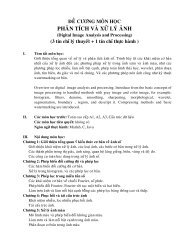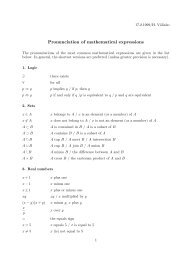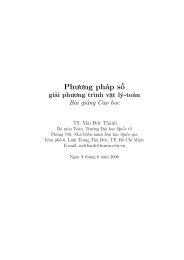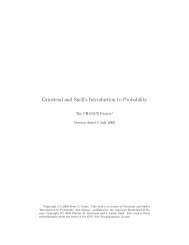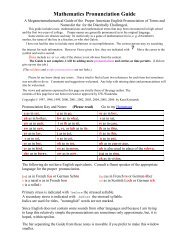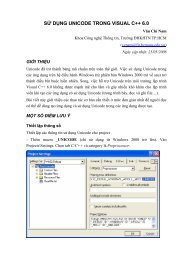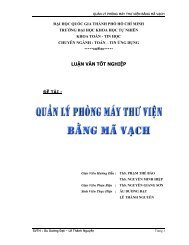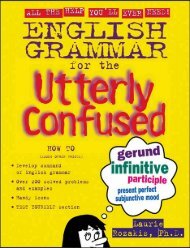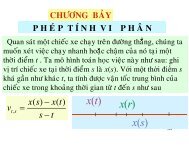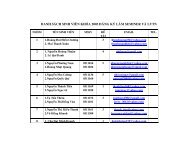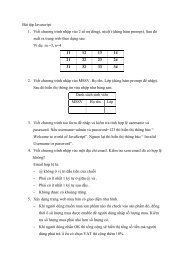- Page 1 and 2: Lecture Notes in Mathematics Editor
- Page 3 and 4: Serge Lang Topics in Cohomology of
- Page 5 and 6: Contents Chapter I. Existence and U
- Page 7 and 8: Preface The Benjamin notes which I
- Page 9 and 10: CHAPTER I Existence and Uniqueness
- Page 11 and 12: I.l 5 We have similar notions on th
- Page 13 and 14: 1.1 7 which makes the right square
- Page 15 and 16: 1.2 9 We have to show that the righ
- Page 17 and 18: 1.2 11 for all a, r E G and a, b E
- Page 19 and 20: 1.2 13 Lemma 2.4. Let A,B, C be G-m
- Page 21 and 22: 1.2 15 Corollary 2.6. Let G' be a s
- Page 23: 1.2 17 Let K1, K2, K be commutative
- Page 27 and 28: 1.3 21 so the cohomology sequence a
- Page 29 and 30: 1.3 23 Theorem 3.5. Let G be a fini
- Page 31 and 32: 1.3 25 Thus we have defined G-modul
- Page 33 and 34: 1.3 27 where the symbol ~j means th
- Page 35 and 36: 1.4 by letting One verifies at once
- Page 37 and 38: 1.4 31 We end our explicit computat
- Page 39 and 40: 1.5 33 be a short exact sequence in
- Page 41 and 42: 1.5 35 Now let A E Mod(G) be arbitr
- Page 43 and 44: CHAPTER II Relations with Subgroups
- Page 45 and 46: II.1 39 Proof. Since ~* is a morphi
- Page 47 and 48: II.1 41 as a functor, not exact, fr
- Page 49 and 50: II.1 43 The unique extension to the
- Page 51 and 52: II. 1 45 Corollary 1.15. Suppose G
- Page 53 and 54: II.1 Proposition 1.16. Let A E Mod(
- Page 55 and 56: II.1 49 Proof. Since Z[U] is natura
- Page 57 and 58: II.2 51 Theorem 2.1. Let Gp be a p-
- Page 59 and 60: II.3 53 Proposition 3.2. Let G be a
- Page 61 and 62: II.3 55 Theorem 3.8. Let U be of fi
- Page 63 and 64: II.3 57 Proposition 3.11. Let G be
- Page 65 and 66: II.4 59 with {7} in some finite sub
- Page 67 and 68: II.4 Proposition 4.4. If c~ E H~(U,
- Page 69 and 70: III.1 63 Corollary 1.2. Let G be a
- Page 71 and 72: III. 1 65 Corollary 1.6. Hypotheses
- Page 73 and 74: III.1 67 Corollary 1.10. Let A E Mo
- Page 75 and 76:
III.2 69 have an injection c : A---
- Page 77 and 78:
III.3 71 A' by means of a cocycle {
- Page 79 and 80:
CHAPTER IV Cup Products w Erasabili
- Page 81 and 82:
IV. 1 75 Let now E1 = (EC~),...,E=
- Page 83 and 84:
IV. 1 77 then we obtain a commutati
- Page 85 and 86:
IV. 1 79 is uniquely determined by
- Page 87 and 88:
IV.1 81 Proposition 1.8. Let G be a
- Page 89 and 90:
IV.2 83 Corollary 1.12. Suppose G f
- Page 91 and 92:
IV.2 85 Lemma 2.2. Let G be a group
- Page 93 and 94:
IV.3 87 and the rest of the proof i
- Page 95 and 96:
IV.5 89 injective, resp. surjective
- Page 97 and 98:
IV.5 91 Proof. We consider the thre
- Page 99 and 100:
IV.5 93 between H-I(Q/Z) and the el
- Page 101 and 102:
IV.6 95 where the vertical maps are
- Page 103 and 104:
IV.6 97 Then resg(0 has order (U e)
- Page 105 and 106:
IV.7 99 Then a~ is an isomorphism f
- Page 107 and 108:
IV.8 101 The bilinear map on top is
- Page 109 and 110:
IV.8 103 There results a pairing of
- Page 111 and 112:
IV.8 105 then (a,r)(.) = (r- e)b is
- Page 113 and 114:
IV.8 107 Using the cocycle relation
- Page 115 and 116:
w Definitions CHAPTER V Augmented P
- Page 117 and 118:
V.1 111 as well as bilinear maps A'
- Page 119 and 120:
V.3 113 Theorem 2.1. Let 91 be a mu
- Page 121 and 122:
V.8 115 Note that the coboundary ma
- Page 123 and 124:
VI.1 117 A spectral sequence in A i
- Page 125 and 126:
vI.2 119 with G/N acting on Hq(N, A
- Page 127 and 128:
VI.3 121 Theorem 2.5. Suppose Hr(N,
- Page 129 and 130:
CHAPTER VII Groups of Galois Type (
- Page 131 and 132:
VII. 1 12~ the maps fi. The interse
- Page 133 and 134:
VII. 1 127 the intersection of a to
- Page 135 and 136:
VII.2 129 p ut: C"(G,A) =0 if r=0 C
- Page 137 and 138:
VII.2 131 Indeed, if G # e, then on
- Page 139 and 140:
VII.2 133 and takes on only a finit
- Page 141 and 142:
VII.2 135 Addition is defined in Iv
- Page 143 and 144:
VII.2 137 discrete case. Again, we
- Page 145 and 146:
VII.3 139 Since one sees that H~(G,
- Page 147 and 148:
VII.3 141 Corollary 3.6. Let Gp be
- Page 149 and 150:
VII.4 143 Proposition 3.12. Let G b
- Page 151 and 152:
VII.4 145 From the definition of th
- Page 153 and 154:
VII.4 147 Next, we connect cohomolo
- Page 155 and 156:
VII.5 149 Corollary 4.5. Let G be a
- Page 157 and 158:
VII.6 151 be the Galois group. If K
- Page 159 and 160:
VII.6 153 Theorem 6.4. Let k be a f
- Page 161 and 162:
vii.6 155 whence the lemma follows.
- Page 163 and 164:
VIII. 1 157 a coboundary. Hence the
- Page 165 and 166:
VIII. 1 159 One sees that F is uniq
- Page 167 and 168:
VIII.2 161 Proposition 2.2. One ha~
- Page 169 and 170:
viii.3 163 and an isomorphism 0 ~ A
- Page 171 and 172:
VIII.3 165 Corollary 3.2. Let G be
- Page 173 and 174:
IX.1 167 H2(V/U, Au). It is by defi
- Page 175 and 176:
IX.1 169 Since the restriction is s
- Page 177 and 178:
IX.2 171 where a, a' denote the fun
- Page 179 and 180:
IX.2 173 with the ordinary functor
- Page 181 and 182:
IX.2 175 These properties are calle
- Page 183 and 184:
IX.2 177 Theorem 2.6. Let G be abel
- Page 185 and 186:
IX.3 179 for every open subgroup U
- Page 187 and 188:
IX.3 181 of subextension, and its c
- Page 189 and 190:
IX.3 183 We consider the cube: A u
- Page 191 and 192:
IX.3 185 immediately from the defin
- Page 193 and 194:
IX.3 187 WT 6. The factor group AU/
- Page 195 and 196:
X.1 189 sion < n if HT(G,A) = 0 for
- Page 197 and 198:
X.2 191 is an ismorphism. It follow
- Page 199 and 200:
X.2 193 Theorem 2.3. We have scd(Gk
- Page 201 and 202:
X.3 195 on Z/eZ. HOmGL/k So no horn
- Page 203 and 204:
X.3 197 Let u E UK, and a E ZO,K. W
- Page 205 and 206:
X.4 199 and let a E A(K) represent
- Page 207 and 208:
X.5 201 Identifying H2(G, ~2") with
- Page 209 and 210:
X.6 203 By Hilbert's Theorem 90 it
- Page 211 and 212:
X.6 205 Thus H2(f~(V)*)/H~(a(V) *)
- Page 213 and 214:
X.6 207 Thus we have proved our red
- Page 215 and 216:
X.6 209 where the @0 on the left me
- Page 217 and 218:
X.7 211 We recall our Picard groups
- Page 219 and 220:
X.8 213 and pairings giving rise to
- Page 221 and 222:
X.8 and a pairing defined by which
- Page 223 and 224:
218 [Ka 69] [KaS 56] [KaT 55] [La 5
- Page 225 and 226:
Table of Notation Ap~ : Elements of
- Page 227 and 228:
Index Abutment of spectral sequence
- Page 229 and 230:
HomG(A, B) 11 Homogeneous standard



